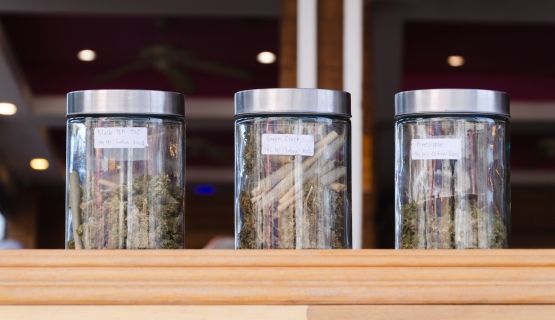Substance use and work
With the legalization of recreational cannabis in Canada, questions have been raised about patterns of cannabis use at work, the use of cannabis to treat work-related injuries, and the implications of such uses for work productivity, workplace health and safety and work disability management. IWH research examines these questions, as well as questions about the use and effectiveness of narcotics or opioids to treat pain, including pain associated with work injuries, and patterns of opioid-related harms among workers.
Featured

Research Highlights
Severe pain, not pressure to return to work or lack of accommodation offer, linked to opioid use post-injury
An IWH study found that among a group of injured workers in Ontario, those who experienced severe pain were more likely to use opioids than those who had no or only mild pain.
Published: February 12, 2025

Issue Briefing
Cannabis use by workers before and after legalization in Canada
Since 2018, when non-medical use of cannabis was legalized in Canada, a pair of Institute for Work & Health (IWH) studies was conducted to explore the implications of this change for workplaces. This briefing sums up their findings.
Published: December 5, 2024
Journal article
Journal article
Workplace and non-workplace cannabis use and the risk of workplace injury: findings from a longitudinal study of Canadian workers
Published: Canadian Journal of Public Health, July 2023
IWH Speaker Series
IWH Speaker Series
Occupational patterns in opioid-related harms among Ontario workers
Surveillance systems that monitor opioid-related harms in Canada do not typically collect work information. Limited data on opioid overdose deaths in Canada point to construction and trades workers as the worker groups most affected by the overdose crisis; but we know little else. Through a collaboration between the Occupational Cancer Research Centre (OCRC) at Ontario Health and the Institute for Work & Health (IWH), a study team has expanded the Occupational Disease Surveillance System (ODSS) to include opioid-related harms. In this presentation, Dr. Nancy Carnide (IWH) and Dr. Paul Demers (OCRC) share findings that have emerged from this unique source of data on a large sample of formerly injured workers.
Published: June 2023

IWH in the media
NSC announces new cannabis-focused report, web tool and webinars
Alex Saurman reports on resources from the National Safety Council relating to cannabis safety, cites IWH speaker series presentation on the effects of cannabis on workers.
Published: Occupational Health & Safety, April 2023

IWH in the media
IWH, OCRC project delves into role of employment in opioid crisis
The number of people who die or who are being hospitalized due to opioids continues to rise, prompting the Institute for Work & Health (IWH) and the Occupational Cancer Research Centre (OCRC) to launch a research project monitoring opioid-related adverse health events in order to identify the worker groups most at risk. Angela Gismondi reports.
Published: Daily Commercial News, August 2022
Journal article
Journal article
Cannabis use and workplace cannabis availability, perceptions and policies among Canadian workers: a comparison before and after the legalisation of non-medical cannabis
Published: Occupational and Environmental Medicine, July 2022

At Work article
Cannabis use linked to higher injury risk, but only among those who use at or before work
Does the use of cannabis increase a worker’s risk of having a workplace injury? Previous studies have found mixed results, but none has looked specifically at the use of cannabis just before or at work.
Published: April 2022
IWH Speaker Series
IWH Speaker Series
Cannabis use and the risk of workplace injury: Findings from a longitudinal study of Canadian workers
Does the use of cannabis increase a worker’s risk of having a workplace injury? Prior studies examining this issue have yielded mixed findings and have had some important methodological shortcomings. In this presentation, Dr. Nancy Carnide shares new findings from a longitudinal study of Canadian workers looking at the relationship between cannabis use and workplace injury—including workplace use.
Published: March 2022

IWH in the media
Supervisors and people in safety-sensitive jobs using cannabis at work, researchers find
Workers who reported using cannabis before or during a shift – including supervisors and people in safety-sensitive jobs – had jobs and work environments in which detection was less likely, according to the results of a recent study out of Canada.
Published: Safety + Health, April 2021

At Work article
At-work cannabis use linked to work factors, including some not expected: IWH study
What factors differentiate people who use cannabis at work from those who don't? An IWH study finds they all relate to people's job characteristics and environments, including some that are surprising.
Published: February 2021
Project
Project
Opioid-related harms among Ontario workers: a surveillance tool
This project draws on a unique surveillance program and uses data-linkage to capture current trends in opioid-related harms among Ontario injured workers.
Status: Ongoing